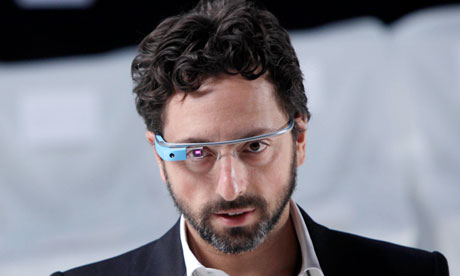Google Glass: is it a threat to our privacy?

If you haven't heard about the excitement around Google Glass – the head-mounted glasses that can shoot video, take pictures, and broadcast what you're seeing to the world – then here's an idea of the interest in them. Last week, someone claiming to be testing Glass for Google auctioned their $1,500 (£995) device on eBay. Bidding had reached $16,000 before eBay stopped it on the basis that the person couldn't prove they had the glasses. (They weren't due to get them until last Friday.)
Google Glass is the most hotly anticipated new arrival in "wearable computing" – which experts predict will become pervasive. In the past 50 years we have moved from "mainframe" computers that needed their own rooms to ones that fit in a pocket; any smartphone nowadays has as much raw computing power as a top-of-the-line laptop from 10 years ago.
The next stage is computers that fit on to your body, and Google's idea is that you need only speak to operate it. The videos that the company has put online – and the demonstrations by Sergey Brin, Google's co-founder, who has been driving these imaginative leaps – suggest you can whirl your child around by their arms, say: "OK, Glass, take video!" and capture the moment. (To activate Glass you need to tilt your head, or touch the side, and then say, "OK Glass, record a video" or "OK Glass take a picture".) The only other way to get that point of view is to strap a camera to your head. Brin has already appeared on stage at a TED conference wearing his Glass glasses (will we call them Glasses?) and looking vaguely like a space pirate. He has described ordinary smartphones as "emasculating" (invoking quite a lot of puzzlement and dictionary-checking: yup, it still means what you thought). And yet people are already beginning to fret about the social implications of Glass (as it's quickly becoming known). The first, and most obvious, is the question of privacy. The second is: how will we behave in groups when the distraction of the internet is only an eye movement away?
David Yee, the chief technology officer at a company called Editorially, tweeted on this point the other day: "There's a young man wearing Google Glasses at this restaurant, which, until just now, used to be my favourite spot."
Yee's worry was that the young person might be filming everything and uploading it to Google's servers (and a Google+ page). Which just feels creepy. It's not a trivial concern. Joshua Topolsky, an American technology journalist who is one of the few to have tried out Google Glass – at Google's invitation – discovered this directly. He wore them to Starbucks, accompanied by a film crew. The film crew were asked to stop filming. "But I kept the Glass's video recorder going, all the way through."
Still, you might think, where's the harm? The thing is, though: this is Google, not Fred's Amazing Spectacles Company. This is the company that has repeatedly breached the boundaries of what we think is "private". From Google Buzz (where it created a "social network" from peoples' email lists, forgetting that sometimes deadly enemies have mutual friends; it was bound over for 20 years by the US's Federal Trade Commission) and the rows over Street View pictures, to the intentional snaffling of wi-fi data while collecting those pictures (a $25,000 fine from the US Federal Communications Commission for obstructing its investigation there).
And that's before you get to criticism in Europe over its attitude to data protection (information commissioners grumbled last October that its unification of its separate privacy policies meant "uncontrolled" use of personal data without an individual's clear consent.
For Google, "privacy" means "what you've agreed to", and that is slightly different from the privacy we've become used to over time. So how comfortable – or uneasy – should we feel about the possibility that what we're doing in a public or semi-public place (or even somewhere private) might get slurped up and assimilated by Google? You can guess what would happen the first time you put on Glass: there would be a huge scroll of legal boilerplate with "Agree" at the end. And, impatient and uncaring as ever, you would click on it with little regard for what you were getting yourself, and others, in to. Can a child properly consent to filming or being filmed? Is an adult, who happens to be visible in a camera's peripheral vision in a bar, consenting? And who owns – and what happens to – that data?
Continue reading at: http://www.guardian.co.uk/technology/2013/mar/06/google-glass-threa...
Tags:
Replies to This Discussion
"Destroying the New World Order"
THANK YOU FOR SUPPORTING THE SITE!
Latest Activity
- Top News
- ·
- Everything
When the Communists Take Over America!...Famous 1957 Anti-Communist Movie
When the Communists Take Over America!...Famous 1957 Anti-Communist Movie
Are the End Times Drawing Near?
Catherine Fitts: Epstein, CIA Black Budget, the Control Grid, and the Banks’ Role in War
Ключові слова в тексті: як органічно їх вписати в статтю
Orwell - Football, Beer & Gambling
I, Pet Goat VI by - Seymour Studios | I, Pet Goat 6
© 2026 Created by truth.
Powered by
![]()